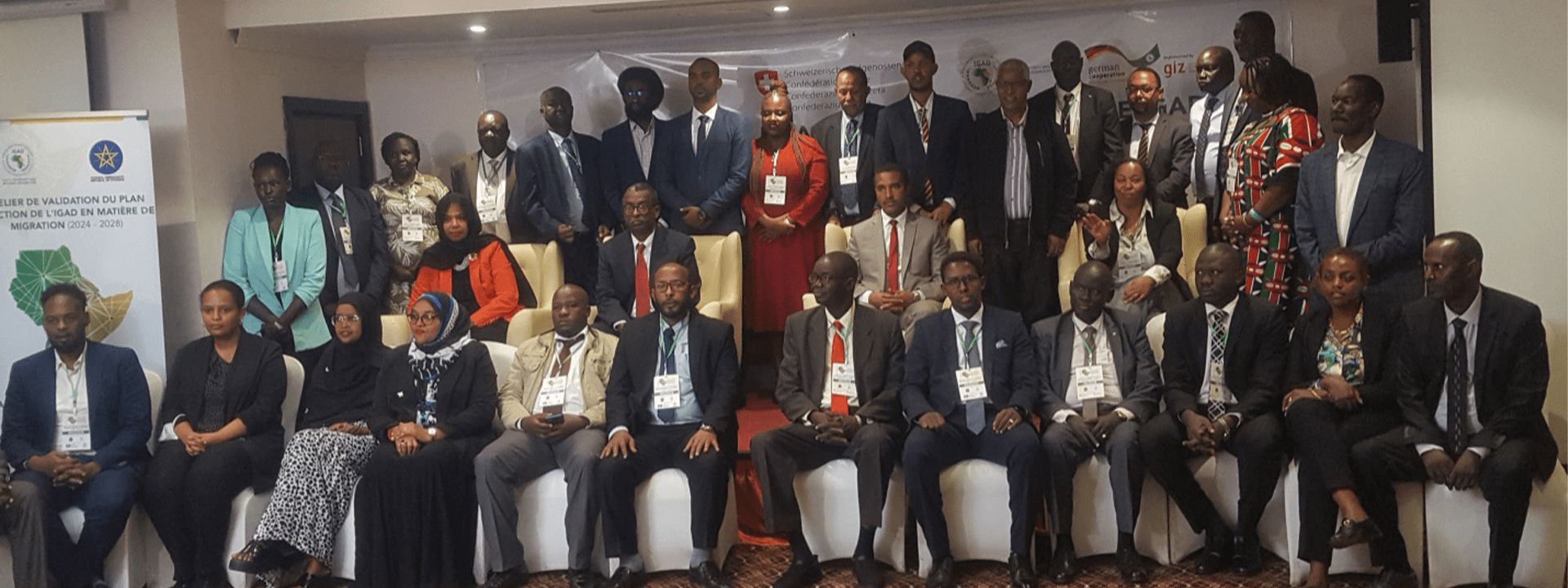15 November 2023 (Addis Ababa, Ethiopia): Member States from the Inter-governmental Authority on Development have validated the revised IGAD Migration Action Plan (MAP) for the period 2024 – 2028.
The validation workshop that was held from 15th -16th November, 2023 at Elilly Hotel in Addis Ababa follows the situational analysis and evaluation of the IGAD Migration Action Plan (2015 – 2020) and considers the changing migration dynamics with in the region, incorporating new strategies and approaches to protect the wellbeing of migrants and refugees throughout their journey.
Speaking on behalf of Workneh Gebeyehu (PhD), Executive Secretary of IGAD, Madam Fathia Alwan, Director for Health and Social Development at the IGAD Secretariat, highlighted that the IGAD Regional Migration Policy Framework of 2012 set out a strategic vision and guiding principles to ensure safe, orderly and well managed migration within the region and the Migration Action Plan translates this vision into concrete actions, providing a roadmap for effective implementation.
“Today, we stand at a critical juncture, where we expect our member states to provide their final input and validate the final version of this MAP, ensuring its relevance, effectiveness, and practicality in addressing the diverse migration challenges and opportunities faced by our region.” She added.
As a chair of IGAD and on behalf of Djibouti, Colonel Idris Djama Guirreh, the Director of Immigration emphasized that the validation of the MAP embodies member states commitment to a shared vision of a more integrated IGAD region. He also called for enhanced collaboration and harmonization of Member States systems that transcend borders.
The partners present also underscored the need for regional approach to ensuring safe, orderly and regular migration in the region as underlined by the Global Compact for Migration (GCM).
Ms. Kokebe Hailegabriel, the GIZ Team Leader of the Strengthening IGAD Migration Policy Implementation (SIMPI) Project, said that revision of the MAP was important in consideration of the recent global and continental frameworks, and that the framework was key to shape migration governance and forced displacement approaches in the IGAD region.
The representative from the Embassy of Switzerland in Ethiopia, Ms. Elshadia Hailu applauded IGAD Secretariat and Members States for the commitment to comprehensive migration policy development at regional and national levels as illustrated by the efforts to engage on migration issues in a collaborative and whole of government approach.
The State Minister for Employment, Jobs and Markets, Federal Democratic Republic of Ethiopia, Y.E Ato Nigusu Tilahun, while closing the validation workshop, thanked the efforts of the Member States and the IGAD Secretariat in reviewing and validating the Migration Action Plan and emphasized the need for IGAD Secretariat to strengthen support to Members States in implementation.
“The presence of well discussed and updated Action plan at regional level will enable Member States to effectively govern migration issues and strengthen the existing coordination at national and regional levels,” he said.
“As we proceed to the implementation of the action plan in the foreseeable future, IGAD’s support to the Member States in the form of capacity building and experience sharing will remain vital and instrumental.”
The development of the MAP was conducted by consulting Member States about their priorities and the significant concerns and opportunities related to migration at national level. The first Migration Action Plan (2015-2020) identified 12 priority areas through which IGAD, its Members States and Partners implemented different projects and initiatives across the region.
Key among these includes the establishment national coordination mechanisms for migration (NCM) that facilitate dialogue, cooperation, and exchange of information on migration issues between IGAD Member States. IGAD further adopted the Protocol on Free Movement of Persons in the IGAD Region, and the Protocol of Transhumance and also adopted the Nairobi Declaration on durable solutions for refugees, returnees and host communities aimed at addressing the needs of protracted refugee settlements.
The revised and validated Migration Action Plan identifies nine priority areas that reflects the complexity and multidimensionality of migration in the region and aimed to address its economic, governance, social and security aspects. The development of the Migration Action Plan (2024 – 2028) was supported by Swiss Development Cooperation.

